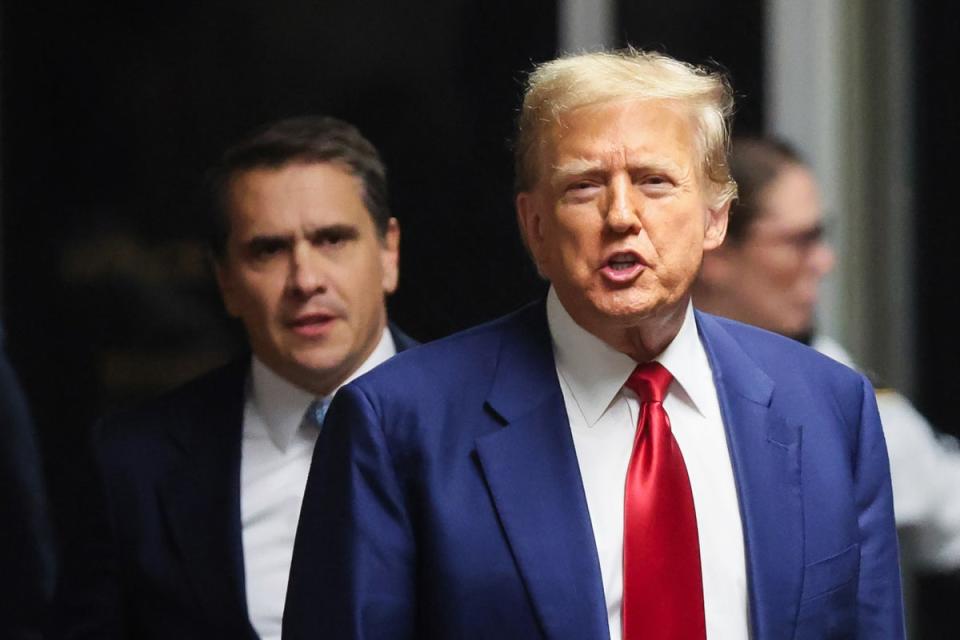Judge sets rescheduled trial date for Trump’s hush money case
Donald Trump will go on trial next month for allegedly falsifying business records that covered up hush money payments to an adult film star, what New York prosecutors have called a criminal scheme to bury embarrassing stories of his affairs in the leadup to the 2016 presidential election.
The trial, which was initially set to begin with jury selection on Monday, will mark the first of four criminal trials against him, and the first-ever criminal trial against any current or former American president.
Mr Trump arrived for yet another pretrial hearing in the case inside a 15th-floor courtroom in Manhattan on Monday as his attorneys prepared to argue allegations of misconduct from the Manhattan District Attorney’s office in front of New York Justice Juan Merchan.
The judge rejected the accusations and set a trial date for Monday, 15 April. Jury selection will begin that week.
Mr Trump’s attorneys said they planned to file a motion to appeal the schedule.
“That’s fine,” Judge Merchan said. “See you all on the 15th.”
Outside the courtroom, Mr Trump fumed over the judge’s decision and labelled the case “election interference” and “voter intimidation.”
Mr Trump appeared in court as he separately faced an imminent deadline to secure nearly half a billion dollars for an appeals bond to block enforcement of a mammoth judgment against him in a civil case.
The former president and his attorneys signalled they were coming up empty-handed at the end of a 30-day grace period to post a $464m appeals bond after Mr Trump and his co-defendants lost a months-long trial on allegations of fraud – opening the door for the state’s attorney general to begin seizing his assets as he fights to overturn the ruling against him.
In the middle of Monday’s hearing in criminal court, a state appellate court extended that deadline by another 10 days and lowered the threshold for bond to $175m.

Last year, in the first criminal indictment against him, a grand jury charged the former president with 34 counts of falsifying business records in connection with repayments to his then-lawyer Michael Cohen, who arranged a hush-money scheme to prevent the release of potentially compromising stories about Mr Trump and his affairs.
The case from the office of Manhattan District Attorney Alvin Bragg could rely on Cohen’s testimony that Mr Trump authorised his business to falsely file payments as legal expenses, part of an alleged effort to quash stories that could interfere with then-candidate Trump’s campaign, according to prosecutors.
Mr Trump, Cohen and David Pecker, the former owner of the National Enquirer, allegedly worked in concert to “identify, purchase, and bury negative information” about then-candidate Trump to boost his electoral prospects,” according to prosecutors.
Former Trump Organization chief financial officer Allen Weisselberg – who was separately prosecuted and convicted on tax fraud charges in 2022 – had agreed that Cohen would be paid “$420,000 to reimburse him for the payment to Daniels,” according to court documents.
Mr Trump finalised the agreement in February 2017, one month after he was sworn into office, according to prosecutors.
Last month, Judge Merchan said a trial is expected to last five to six weeks, with 15 to 17 days for the prosecution’s arguments, running from 9.30am to 4.30pm ET on weekdays, except on Wednesdays.
The trial – taking place in the middle of Mr Trump’s presidential campaign, and expected to last up until the Republican National Convention – is the first among the four cases encompassing 88 criminal charges against the former president.
Mr Trump is federally charged with obstruction and conspiracy for his multi-state effort to overturn 2020 election results and for his failure to stop a mob that sought to do it by force. He is separately charged in Georgia for his alleged “criminal enterprise” to overturn that state’s results.
He also is federally charged for his withholding of classified documents at his Mar-a-Lago property after he left the White House.
Mr Trump has claimed “presidential immunity” from prosecution in his attempts to have the charges against him dismissed. That defence will be tested at the US Supreme Court next month, days after Mr Trump’s criminal trial in Manhattan is set to begin.


